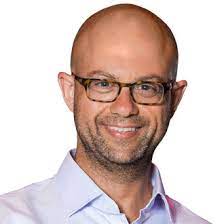Solo Entrepreneur Bootstrapping to over $5M: Vladimir Gendelman, CEO of Company Folders (Part 2)
Sramana Mitra: What were you offering people to buy?
Vladimir Gendelman: I started selling online right away. The very first version of the website was very basic. I just came up with a whole bunch of folders styles. I put them on a website. There weren’t that many. I started promoting.
Sramana Mitra: How did you promote it?
>>>Featured Videos
Solo Entrepreneur Bootstrapping to over $5M: Vladimir Gendelman, CEO of Company Folders (Part 1)

Ukrainian entrepreneur Vladimir Gendelman started as a solo entrepreneur in Detroit and has bootstrapped a $5M+ niche e-commerce company.
Sramana Mitra: Let’s start at the very beginning of your journey. Where are you from? Where were you born and raised? What kind of background?
>>>Netflix Explores Various Monetization Options Including Ads

Earlier last week Netflix (Nasdaq: NFLX) reported a mixed bag second quarter performance. The company continues to drive revenue through improved monetization practices globally.
>>>Video FAQs
Can 1M/1M Help Me Raise Money?
How Does 1M/1M Democratize Entrepreneurship Education?
How Does 1M/1M Democratize Management Consulting?
When Is The Right Time To Join 1M/1M?
Can 1M/1M Help Me With Business Development?
Can 1M/1M Help Me With Market Sizing?
Can 1M/1M Help Me Validate My Product?
Will I Have Private 1-on-1 Sessions In 1M/1M?
How Does 1M/1M Help Entrepreneurs Connect With Silicon Valley?
Mentoring or Consulting?
Why Does 1M/1M Charge $1000 a Year?
Why Does 1M/1M Partner With Local Organizations?
Why Don\’t Mentoring Networks Work?
Why Is It Important To Study With 1M/1M Now?
Dan Stewart Story
Vikrant Mathur Story
Best of Bootstrapping: Bootstrapped First to $10M from Finland

If you haven’t already, please study our Bootstrapping Course and Investor Introductions page.
In our effort to bring you stories from the global startup ecosystem, here we introduce you to Mikko Valimaki, Co-founder of Tuxera, and his wonderful success story from Finland in 2016.
Sramana Mitra: Let’s start at the very beginning of your journey. Where are you from? Where were you born, raised, and in what kind of circumstances?
Mikko Valimaki: I’m a 39-year-old guy from Finland. I did my schooling in Finland. I did, however, study in Berkeley in the United States and was exposed to the American culture. I’ve never worked for any big company. I always started my own stuff. I had already developed my own computer games back in the 1990s while at high school. I tried to sell those.
Capital Efficient Entrepreneurship from the Czech Republic: Runecast CEO Stan Markov (Part 6)
Sramana Mitra: What about events? Is that something that you’ve done in those marketplaces?
Stan Markov: Yes, we haven’t been to a Microsoft of Google event. We’ve been to the AWS ReInvent and exhibited there. We’ve also been to the KubeCon event. It’s a great audience and a great source of leads.
>>>Best of Bootstrapping: Bootstrapped to $5M from Scratch

If you haven’t already, please study our Bootstrapping Course and Investor Introductions page.
The Innovation Management software space is quite crowded. When I spoke to Co-founder Robert Hoehn in 2016, IdeaScale had managed to carve out a niche. Read on!
Sramana Mitra: Let’s start by going to the very beginning of your journey. Where are you from? Where were you born, raised, and in what kind of background?
Robert Hoehn: I am from Northern New York, almost bordering Canada. I actually did Computer Science in high school. I was a pretty lucky kid to have experience in programming at a pretty young age. I went to the University of Vermont and joined their Computer Engineering program. I studied Computer Science and Business.
Capital Efficient Entrepreneurship from the Czech Republic: Runecast CEO Stan Markov (Part 5)
Sramana Mitra: Tell me more about how things evolved now that you have some money and have a team together. How are things going in 2018 and 2019?
>>>Catching Up On Readings: Microsoft Inspire 2023
This feature from Tech Republic covers the highlights of the Microsoft Inspire event held virtually last week including innovations, investments, programs, and partner opportunities in new forms of AI such as ChatGPT and Copilot. For this week’s posts, click on the paragraph links.
>>>